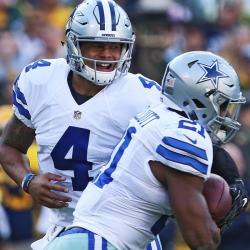As the National Football League’s ratings are down for the second year in a row, several media outlets have recommended the NFL embrace sports betting to boost ratings. Among the major American sports leagues’ commissioners, NFL Commissioner Roger Goodell maintains the most hardline stance against sports betting.
The NFL’s Week 1 TV ratings were down 13% year-to-year, besides Monday Night Football. Those figures are particularly notable, because ratings were down over the first few weeks of 2016 between 6% and 15%.
At the time, pundits had several explanations for the league’s drop in popularity: National Anthem protests and public interest in the US presidential election chief among them. Some pointed to the absence of key NFL stars, such as Peyton Manning to retirement and Tom Brady to suspension. A relative decline in fantasy football interest, the concussion issue, and repeated player scandals also were peddled as excuses.
NFL Ratings Are Down 13%
This time, the experts noted that Week 1’s games were uncompetitive. Of course, viewers have to turn to the game to know it’s uncompetitive, so that is hardly an excuse. The fact the NFL is in a transitional stage in terms of stardom might be an answer, but prestige teams like the Dallas Cowboys and Oakland Raiders are back among the league’s elite, while the nation’s second-largest population center now has two teams, instead of none. One set of factors should outweight the other.
It hardly matters what the reasons for the decline are; ratings are down for a second year in a row and Roger Goodell needs to reverse the trend. Given the options at hand, the only option with the proven ability to raise interest levels is federally legalized sports betting. To this point, the NFL’s leaders do not to have noticed America’s changing attitudes towards gambling, or acknowledged how important gaming is to their business model. Of course, the decision might be left out of the NFL’s hands.
US Supreme Court Reviews Sports Betting
Currently, the U.S. Supreme Court is reviewing the constitutionality of a federal ban on sports betting, the Professional and Amateur Sports Protection Act (PASPA). The 1992 PASPA law banned sports betting in 46 US states, allowed “sports lotteries” in 3 other states (Montana, Oregon, and Delaware), and legalized sportsbooks in Nevada. For the past 5 years, New Jersey has challenged PASPA with its own regulations, which would have allowed Atlantic City casinos and Monmouth Park racetrack to offer sports wagers.
New Jersey’s challenge played-out in the American court system, after the US sports leagues brought lawsuits. The NFL, NBA, and Major League baseball joined forces on the legal challenge, but the NFL is the staunchest of the three on the issue. NBA Commissioner Adam Silver said he supports federal regulations on sports betting, while MLB Commissioner Rob Manfred said he is willing to discuss changes in the sportsbook laws. Roger Goodell has not changed his position one bit, even after approving the Oakland Raiders’ move to Las Vegas (in 2020).
MoffettNathanson Research on Sports Betting
In February 2017, MoffettNathanson Research released a report on the impact legal and regulated sports betting would have on NFL viewership. The report stated that roughly 10% of the current non-gambling viewers of NFL games would partake in sports gambling, if it was legal and convenient to do so.
The Moffett-Nathanson report (paywall: NFL Season Recap: It’s All Over But the Crying) also noted that almost 50% of the viewers of sports programming would be bettors. The study showed, “On a network by network business, the NFL Network and ESPN were more likely to be viewed by sports bettors versus the average viewer. These trends would be further inflated if gambling were to be legalized …. If gambling were allowed, a majority of NFL Network viewers would be sports bettors, followed closely by 47 percent on ESPN. The broadcast networks would all be closer to the 40 percent range.”
The fact is, team loyalty is one thing. Love of the sport of football is another. Some viewers need to have a personal stake on the line to become dedicated viewers of a game. A sports viewer needs to have a rooting interest in a game, or watching the NFL is like watching a movie whose characters do not interest you; the outcome doesn’t matter. For many people, bets hook them into the storyline better than fantasy football.
Ban on Sports Betting Is Coming to an End
The Supreme Court will rule on sports betting later on this year or early next year. Even if PASPA is allowed to remain, major US financial institutions and sports executives alike say they expect to see the federal ban on sportsbooks ended within the next 5 years. Las Vegas’s virtual monopoly on sports gambling will end, sooner or later.
The main reason it will end is because Las Vegas does not really have a monopoly. While Vegas Strip sportsbooks generate billions of dollars in action each year, the American Gaming Association estimates 97% of sports bets are handled illegally in the United States each year. Sports betting is a $150 billion underground economy. That represents a tremendous new revenue stream for the NFL and other American sports leagues, if they position themselves to take advantage of it. Roger Goodell will have to embrace sports betting, or find himself on the wrong side of history.

